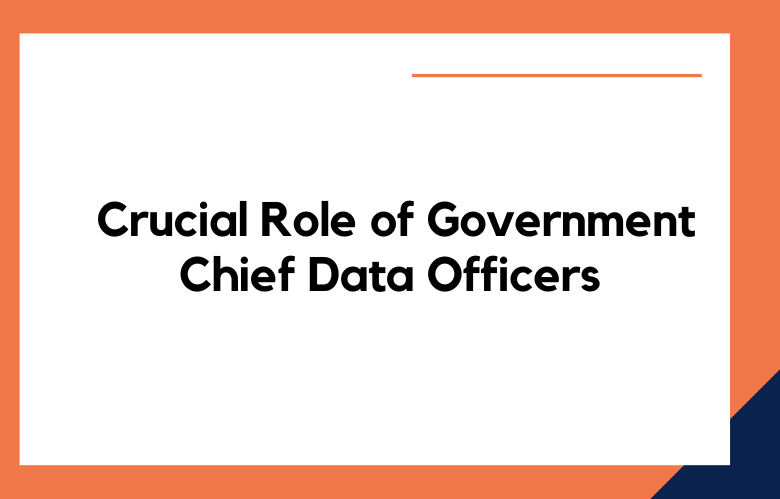In today’s data-driven world, governments increasingly rely on data to inform decision-making, drive innovation, and improve service delivery. Governments are turning to Chief Data Officers (CDOs) to effectively leverage data’s power to lead their data strategies and operations.
The Crucial Role of Government Chief Data Officers
CDOs play a crucial role in government by ensuring data is managed strategically and used responsibly to achieve public sector goals. Here are some of the critical responsibilities of a government CDO:
Data Governance: CDOs establish policies, procedures, and standards for data management and usage across government agencies to ensure data quality, security, and privacy.
Data Integration: CDOs work to integrate data from disparate sources and systems to enable holistic analysis and decision-making.
Data Analytics: CDOs leverage advanced analytics techniques to derive insights from government data, informing policy-making and service delivery optimization.
Data Sharing: CDOs facilitate sharing between government agencies and external stakeholders to enable collaboration and innovation.
Data Literacy: CDOs promote data literacy across government, helping employees understand the value and potential of data in their work.
Overall, government CDOs play a critical role in harnessing the power of data to drive evidence-based decision-making, improve service delivery, and foster innovation in the public sector.
Data-Driven Government: The Rise of Chief Data Officers
The rise of data-driven decision-making has transformed how governments operate and deliver services to their constituents. As the volume and complexity of government data continue to grow, so does the need for specialized expertise to manage and leverage this valuable resource. This has led to the emergence of a new role in government: the Chief Data Officer (CDO).
CDOs oversee the management and utilization of government data to drive evidence-based policy-making, improve service delivery, and foster innovation. They are charged with establishing data governance frameworks, integrating disparate data sources, leveraging advanced analytics, and promoting data literacy across government.
The rise of CDOs in government reflects a broader trend towards data-driven decision-making in the public sector. Governments increasingly recognize the value of data as a strategic asset that can be used to improve outcomes and deliver better services to citizens. CDOs play a critical role in realizing this potential by ensuring data is managed effectively and responsibly.
Navigating the Data Revolution: The Key Role of Government CDOs
The world has recently witnessed a data revolution, with governments collecting and generating vast amounts of data on everything from healthcare to transportation to education. However, simply having access to this data is not enough – governments must also have the tools and expertise to analyze and use this data effectively. This is where the role of the Chief Data Officer (CDO) comes in.
CDOs oversee an organization’s data strategy, management, and governance. In government, this means ensuring that data is used effectively and responsibly to support policy-making, program evaluation, and service delivery.
One of the key challenges facing government CDOs is the sheer volume and complexity of government data. Data is often siloed within different agencies and departments, making it difficult to integrate and analyze. Additionally, government data usually comes in various formats and from other sources, further complicating efforts to derive meaningful insights.
Leading the Way: Government Chief Data Officers in the Digital Age
Data has become a critical asset for governments worldwide in today’s digital age. From improving healthcare outcomes to optimizing transportation systems, data can transform how governments operate and deliver services to their citizens. However, to fully realize the benefits of data, governments need leaders who can effectively manage and leverage this valuable resource. Enter the Chief Data Officer (CDO).
CDOs are responsible for developing and implementing an organization’s data strategy, overseeing data management and governance, and promoting data literacy. In government, CDOs play a crucial role in ensuring that data is used effectively and responsibly to drive evidence-based decision-making, improve service delivery, and foster innovation.
The Power of Data: How CDOs Are Shaping Government Strategy
CDOs are responsible for developing and implementing data strategies that align with their organizations’ broader goals and priorities. In government, this means using data to inform policy-making, improve service delivery, and drive innovation in healthcare, education, and transportation.
CDOs must navigate a complex landscape of data sources, formats, and regulations to achieve these goals. They must also work to build data literacy and a data-driven culture within their organizations, ensuring that data is used effectively and responsibly across all levels of government.
Despite these challenges, CDOs are already making significant strides in shaping government strategy. For example, some governments use data to identify at-risk populations and effectively target social services. Others use data to improve traffic flow and reduce congestion on busy roads.
Data Management in Government: The Critical Role of Chief Data Officers
In government operations, appointing Chief Data Officers (CDOs) marks a significant evolution toward embracing data as a strategic asset. The critical role of CDOs in government underscores a commitment to leveraging data for enhanced transparency, efficiency, and policy effectiveness. These stewards oversee data governance, ensure data quality, and promote data-driven decision-making across various governmental departments and agencies.
CDOs in government play a pivotal role in breaking down data silos, fostering inter-departmental collaboration, and facilitating the sharing of data insights. This not only aids in more informed policy-making but also enhances public services, tailoring them to meet the nuanced needs of the citizenry. By implementing robust data management frameworks, CDOs ensure that data is accessible, secure, and utilized by privacy and ethical standards.
Furthermore, the strategic initiatives led by CDOs often include harnessing advanced analytics, artificial intelligence, and machine learning to predict trends, optimize resource allocation, and tackle complex societal challenges. Their work is instrumental in transforming government operations, making it more responsive, accountable, and citizen-centric.
Harnessing Data for Better Governance: The Importance of CDOs
In the modern era, data has become a crucial asset for governments worldwide. From improving healthcare outcomes to reducing crime rates, data can transform how governments operate and deliver services to their citizens. However, to fully leverage the potential of data, governments need to have exemplary leadership in place. This is where Chief Data Officers (CDOs) come in.
CDOs are responsible for developing and implementing data strategies aligning with the government’s goals. They ensure data is collected, stored, and analyzed securely, ethically, and effectively. CDOs promote a data-driven culture within government organizations, ensuring data is used to inform decision-making at all levels.
One key benefit of having a CDO is identifying patterns and trends that might not be immediately obvious. By analyzing large datasets, CDOs can help governments identify areas where resources are underutilized or services are falling short. This can lead to more targeted and effective interventions, ultimately improving citizens’ lives.
The Data Imperative: Why Government Needs Chief Data Officers
As the world becomes increasingly data-driven, governments recognize the imperative to harness the power of data to improve governance, deliver better services, and drive innovation. To achieve these goals, many governments are turning to Chief Data Officers (CDOs), who are responsible for developing and implementing data strategies that align with their organizations’ broader objectives.
CDOs are critical in enabling governments to become more data-driven. They provide strategic leadership, technical expertise, and cross-functional collaboration to ensure data is used effectively and responsibly. CDOs can help break down silos within government agencies, promote data sharing and integration, and build data literacy across the organization.
Conclusion:
Government Chief Data Officers play a critical role in leveraging the power of data to improve decision-making, drive innovation, and enhance service delivery in the public sector. By establishing robust data governance frameworks, integrating disparate data sources, leveraging advanced analytics, facilitating data sharing, and promoting data literacy, CDOs help governments maximize the value of their data assets and achieve their goals.
As governments continue to embrace data-driven approaches, the role of the CDO will only become more critical in ensuring that data is used responsibly and effectively to serve the public interest.
Call: +91 9848321284
Email: [email protected]











